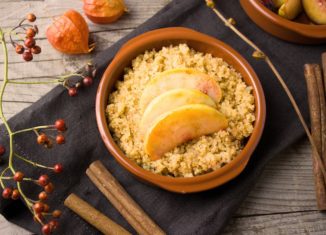
Protein is an essential nutrient our bodies need for many functions, including building and repairing tissues, producing hormones and enzymes, and supporting immune health. While many people think of meat, poultry, and fish as the primary sources of protein, many healthy foods are surprisingly high in protein. In this post, Alan Morton from TRAINFITNESS Online Personal Trainer Courses helps us explore five foods and how they can help you meet your protein needs.
From tasty oats to nutrient-rich lentils, these foods are high in protein and packed with other essential nutrients that can support your overall health and well-being. So if you want to increase your protein intake without relying on meat, read on to discover some tasty and healthy options.
Oats
- 2g of protein per 100 grams
- 5g of protein per cup
Oats are a type of whole grain packed with nutrients and make a great addition to a healthy diet. They are high in protein, fibre, and vitamins and minerals such as zinc, magnesium, and iron. Oats are also low in calories and can help you feel full and satisfied, making them an excellent choice for weight management.
Oats are versatile and can be used in various dishes, such as oatmeal, granola, and smoothies. They can also be added to baked goods, such as muffins and cookies, to boost their nutritional value.
Eating oats as part of a healthy diet can have numerous health benefits. They can help lower cholesterol levels and reduce the risk of heart disease. They may also help regulate blood sugar levels and improve gut health.
Oats are a nutritious and versatile food that can be easily incorporated into a healthy diet. They are high in protein, fibre, and other nutrients and can provide various health benefits.
Quinoa
- 4g of protein per 100 grams
- 8g of protein per cup
Quinoa is a type of grain often considered a superfood because of its high protein content and impressive nutrient profile. It is a complete protein containing all nine essential amino acids, making it a great plant-based protein source. In addition to protein, quinoa is also high in fibre, vitamins, and minerals, such as magnesium, zinc, and iron.
Quinoa is versatile and can be used in various dishes, such as salads, soups, and grain bowls. It can also be used as a substitute for rice or pasta in many dishes, boosting protein and other nutrients.
Quinoa is easy to cook and only takes about 15 minutes to prepare.
Incorporating quinoa into your diet can have numerous health benefits. Its high protein and fibre content can help you feel full and satisfied, making it an excellent choice for weight management. It also helps regulate blood sugar levels and improve gut health. Quinoa is also naturally gluten-free, making it a perfect option for people with celiac disease or gluten sensitivity.
Lentils
- 9g of protein per 100g
- 18g of protein per cup
Lentils are a type of legume high in protein and packed with essential nutrients. In addition to protein, lentils are also high in fibre, vitamins, and minerals, such as iron, potassium, and folate.
Lentils are versatile and can be used in various dishes, such as soups, stews, and curries. They can also be used as a substitute for ground meat in dishes like tacos and meatballs, which boosts the protein and other nutrients. Lentils are also easy to cook and only take about 20-30 minutes to prepare.
Incorporating lentils into your diet can have numerous health benefits. Their high protein and fibre content can help you feel full and satisfied, making them an outstanding choice for weight management. They may also help regulate blood sugar levels and improve gut health. Lentils are also naturally gluten-free, making them a perfect option for people with celiac disease or gluten sensitivity.
Oats, quinoa and lentils – are all fantastic protein sources and can be easily incorporated into a healthy diet. They are high in protein and packed with other essential nutrients that can support your overall health and well-being. So next time you want to increase your protein intake, consider adding some tasty and healthy foods to your meals. You may be surprised at how much protein they can provide and how delicious they can be.
